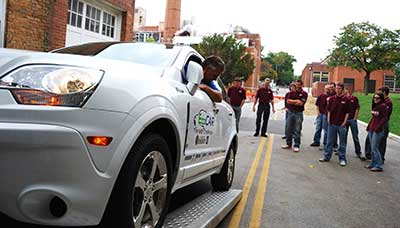Oct 18 2009
When a college student receives a new car, their first typical thought isn't how they'll dismantle the vehicle's engine and re-engineer it for maximum fuel efficiency and lowest possible emissions. But that's exactly what members of the Hybrid Electric Vehicle Team of Virginia Tech (HEVT) plan to do with a 2009 crossover SUV, donated by General Motors.
 The 2009-10 Hybrid Electric Vehicle Team of Virginia Tech (HEVT) witness delivery of a 2009 crossover SUV donated by General Motors. As part of the EcoCAR Challenge, the team will re-engineer the car to use less fuel per mile and cut emissions. Among those in the background is Doug Nelson, professor of mechanical engineering and the faculty adviser for the EcoCAR Challenge competition
The 2009-10 Hybrid Electric Vehicle Team of Virginia Tech (HEVT) witness delivery of a 2009 crossover SUV donated by General Motors. As part of the EcoCAR Challenge, the team will re-engineer the car to use less fuel per mile and cut emissions. Among those in the background is Doug Nelson, professor of mechanical engineering and the faculty adviser for the EcoCAR Challenge competition
The Virginia Tech College of Engineering student team has taken delivery of the car as part of the EcoCAR Challenge, a three-year design competition sponsored chiefly by the U.S. Department of Energy and General Motors. EcoCAR seeks to inspire science and engineering students to build more energy-efficient "green" automobiles, according to event organizers.
During the 2008-09 academic year, HEVT was tasked with creating a virtual model of a crossover SUV to improve fuel efficiency and reduce emissions while retaining the vehicle's performance and consumer appeal. The team placed sixth out of 17 competitors during the first year design and computer modeling phase.
The second phase of EcoCAR Challenge, now underway, gives student teams the physical challenge of turning their cutting-edge design into reality. The HEVT designed Extended-Range Electric Vehicle (E-REV) is powered by an electric motor and a 4-cylinder 2.4L GM EcoTec engine, and is fueled by grid electricity and E85 (85 percent ethanol and 15 percent gasoline) fuel. The completion will lead to the cars being road-tested in May 2010.
Doug Nelson, Virginia Tech professor of mechanical engineering, is the founding adviser of HEVT. He recently won a $10,000 cash prize for research purposes from the National Science Foundation as part of the EcoCAR Challenge competition.
"Our main modifications are to make the vehicle a plug-in hybrid using a large battery and electric motor to use grid electricity to displace fuel use. The vehicle will go over 40 miles in electric vehicle mode, and thus meet most driver's daily trip needs," Nelson said. "When the battery is depleted, the vehicle will use E85 fuel to further reduce petroleum energy use and provide full performance including towing."
Virginia Tech is competing with 16 universities: Embry-Riddle Aeronautical University, Georgia Tech, Howard University, Michigan Technological University, Mississippi State University, Missouri University of Science and Technology, North Carolina State University, Ohio State University, Pennsylvania State University, Rose-Hulman Institute of Technology, Texas Tech University, University of Ontario Institute of Technology, University of Victoria, University of Waterloo, University of Wisconsin-Madison and West Virginia University.